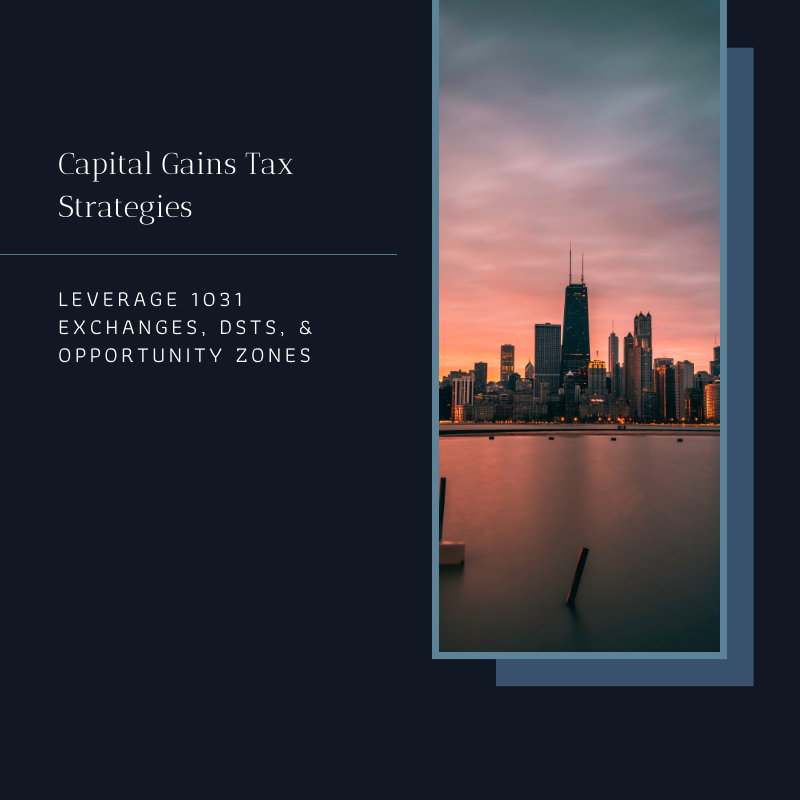In the realm of selling business assets or real estate, capital gains tax strategies play a pivotal role in maximizing financial outcomes. The tax levied on the profit from these sales can significantly impact your investment’s profitability. However, leveraging strategies like 1031 exchanges, Delaware Statutory Trusts (DSTs), and investments in Opportunity Zones can offer substantial tax benefits. This guide delves into how these strategies can be employed effectively, aiming to optimize your understanding and application for enhanced investment returns.
Leveraging 1031 Exchanges for Real Estate Investments
A 1031 exchange, rooted in Section 1031 of the U.S. Internal Revenue Code, offers real estate investors a path to defer capital gains taxes by reinvesting sale proceeds into like-kind properties. This strategy is ideal for investors aiming to expand their portfolios without immediate tax consequences.
Implementing a 1031 Exchange:
- Identify Replacement Properties: Post-sale, you have 45 days to pinpoint up to three replacement properties, setting the stage for a successful exchange.
- Adhere to Timelines: The acquisition of the new property must be finalized within 180 days from the sale of the original asset.
- Engage a Qualified Intermediary: A crucial step involves enlisting a Qualified Intermediary to hold the sale proceeds, ensuring compliance and facilitating the exchange process.
Maximizing Investments with Delaware Statutory Trusts (DSTs)
Delaware Statutory Trusts offer a unique vehicle for investors to defer capital gains taxes through a 1031 exchange. By enabling investment in a fractional interest of larger real estate assets, DSTs present an opportunity for diversification and passive income generation.
Benefits of Investing in DSTs:
- Tax Deferral: Convert real estate assets into DST investments to postpone capital gains taxes, enhancing liquidity and investment potential.
- Access to Larger Ventures: DSTs open doors to significant real estate investments previously beyond individual financial reach, promoting portfolio growth.
- Simplified Management: With professional management, DST investors can enjoy the benefits of real estate investment without the day-to-day operational responsibilities
Investing in Opportunity Zones for Tax Advantages
Opportunity Zones, established by the 2017 Tax Cuts and Jobs Act, incentivize economic development in designated areas through tax benefits for investors. By directing capital gains into Qualified Opportunity Funds that invest in these zones, investors can achieve tax deferment and potential elimination on long-term investments.
Capitalizing on Opportunity Zone Investments:
- Deferred Tax Payment: Investing in a Qualified Opportunity Fund allows for the deferment of capital gains taxes, with a set timeline for payment, providing immediate tax relief and investment capital.
- Basis Step-Up for Long-Term Investments: Holding investments in the fund for over five or seven years results in a 10% or 15% exclusion of the deferred gain, respectively, reducing overall tax liability.
- Elimination of Appreciation Tax: A decade-long investment in an Opportunity Zone can lead to zero capital gains tax on the appreciation of the investment, maximizing profit potential.
Conclusion: Strategic Tax Planning for Enhanced Investment Returns
The intricate landscape of capital gains tax can be navigated effectively with strategies like 1031 exchanges, Delaware Statutory Trusts, and Opportunity Zone investments. By understanding and applying these methods, investors can substantially reduce their tax liabilities while fostering growth in their investment portfolios. It’s essential to consult with financial and tax professionals to tailor these strategies to your specific financial goals and ensure compliance with regulatory requirements. Adopting these optimized tax strategies can significantly impact your investment success, turning potential tax burdens into opportunities for expansion and profit.
This content is developed from sources believed to be providing accurate information. It may not be used for the purpose of avoiding any federal tax penalties. Please consult legal or tax professionals for specific information regarding your individual situation. The opinions expressed and material provided are for general information, and should not be considered a solicitation for the purchase or sale of any security.

